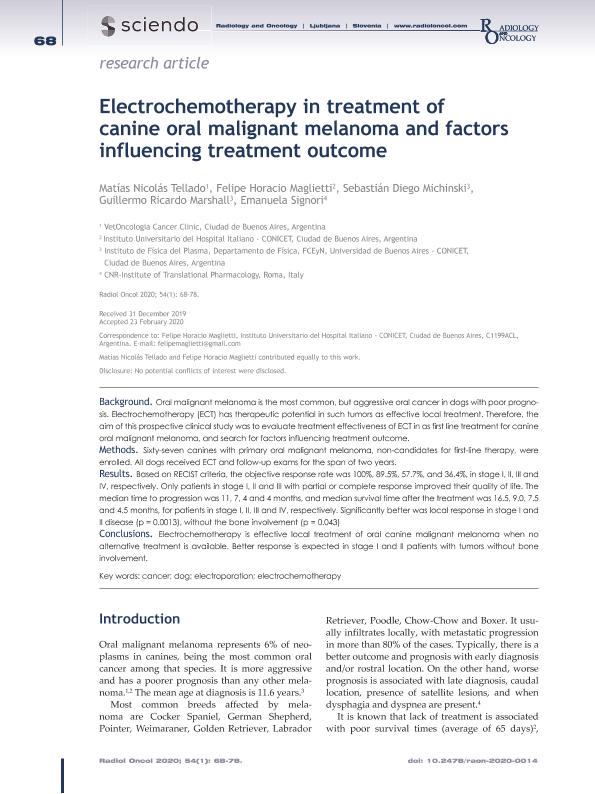Mostrar el registro sencillo del ítem
dc.contributor.author
Tellado, Matías Nicolás

dc.contributor.author
Maglietti, Felipe Horacio

dc.contributor.author
Michinski, Sebastián Diego

dc.contributor.author
Marshall, Guillermo Ricardo

dc.contributor.author
Signori, Emanuela

dc.date.available
2021-11-09T10:22:11Z
dc.date.issued
2020-03
dc.identifier.citation
Tellado, Matías Nicolás; Maglietti, Felipe Horacio; Michinski, Sebastián Diego; Marshall, Guillermo Ricardo; Signori, Emanuela; Electrochemotherapy in treatment of canine oral malignant melanoma and factors influencing treatment outcome; Assoc Radiology & Oncology; Radiology And Oncology; 54; 1; 3-2020; 68-78
dc.identifier.issn
1318-2099
dc.identifier.uri
http://hdl.handle.net/11336/146362
dc.description.abstract
Oral malignant melanoma is the most common, but aggressive oral cancer in dogs with poor prognosis. Electrochemotherapy (ECT) has therapeutic potential in such tumors as effective local treatment. Therefore, the aim of this prospective clinical study was to evaluate treatment effectiveness of ECT in as first line treatment for canine oral malignant melanoma, and search for factors influencing treatment outcome. Sixty-seven canines with primary oral malignant melanoma, non-candidates for first-line therapy, were enrolled. All dogs received ECT and follow-up exams for the span of two years. Based on RECIST criteria, the objective response rate was 100%, 89.5%, 57.7%, and 36.4%, in stage I, II, III and IV, respectively. Only patients in stage I, II and III with partial or complete response improved their quality of life. The median time to progression was 11, 7, 4 and 4 months, and median survival time after the treatment was 16.5, 9.0, 7.5 and 4.5 months, for patients in stage I, II, III and IV, respectively. Significantly better was local response in stage I and II disease (p = 0.0013), without the bone involvement (p = 0.043) Electrochemotherapy is effective local treatment of oral canine malignant melanoma when no alternative treatment is available. Better response is expected in stage I and II patients with tumors without bone involvement.
dc.format
application/pdf
dc.language.iso
eng
dc.publisher
Assoc Radiology & Oncology

dc.rights
info:eu-repo/semantics/openAccess
dc.rights.uri
https://creativecommons.org/licenses/by-nc-nd/2.5/ar/
dc.subject
CANCER
dc.subject
DOG
dc.subject
ELECTROCHEMOTHERAPY
dc.subject
ELECTROPORATION
dc.subject.classification
Oncología

dc.subject.classification
Medicina Clínica

dc.subject.classification
CIENCIAS MÉDICAS Y DE LA SALUD

dc.title
Electrochemotherapy in treatment of canine oral malignant melanoma and factors influencing treatment outcome
dc.type
info:eu-repo/semantics/article
dc.type
info:ar-repo/semantics/artículo
dc.type
info:eu-repo/semantics/publishedVersion
dc.date.updated
2021-09-17T16:45:19Z
dc.journal.volume
54
dc.journal.number
1
dc.journal.pagination
68-78
dc.journal.pais
Eslovenia

dc.journal.ciudad
Ljibljana
dc.description.fil
Fil: Tellado, Matías Nicolás. No especifíca;
dc.description.fil
Fil: Maglietti, Felipe Horacio. Hospital Italiano; Argentina. Consejo Nacional de Investigaciones Científicas y Técnicas; Argentina
dc.description.fil
Fil: Michinski, Sebastián Diego. Consejo Nacional de Investigaciones Científicas y Técnicas. Oficina de Coordinación Administrativa Ciudad Universitaria. Instituto de Física del Plasma. Universidad de Buenos Aires. Facultad de Ciencias Exactas y Naturales. Instituto de Física del Plasma; Argentina
dc.description.fil
Fil: Marshall, Guillermo Ricardo. Consejo Nacional de Investigaciones Científicas y Técnicas. Oficina de Coordinación Administrativa Ciudad Universitaria. Instituto de Física del Plasma. Universidad de Buenos Aires. Facultad de Ciencias Exactas y Naturales. Instituto de Física del Plasma; Argentina
dc.description.fil
Fil: Signori, Emanuela. Centre National de la Recherche Scientifique; Francia
dc.journal.title
Radiology And Oncology

dc.relation.alternativeid
info:eu-repo/semantics/altIdentifier/doi/http://dx.doi.org/10.2478/raon-2020-0014
Archivos asociados
